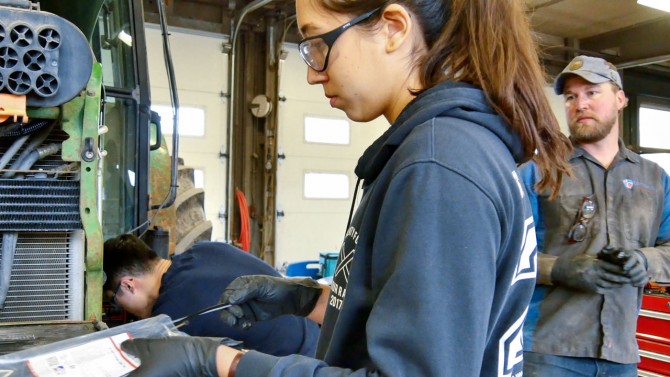
By Blaine Friedlander
A week before the Ithaca campus shut down due to the COVID-19 pandemic, members of an engineering student group converted a university-owned diesel tractor into a clean, green farming machine.
Instead of emitting the notoriously noxious black diesel smoke, the tractor now emits a much lighter colored exhaust with a smell more reminiscent of French fries than farm implements. That’s thanks to its soy-based biodiesel fuel, as the updated tractor helps the university take another step toward its goal of carbon neutrality by 2035.
“A carbon-neutral campus is an inspiring vision,” said H. Oliver Gao, professor of engineering and director of Cornell’s Center for Transportation, Environment and Community Health, which helped create the project. “This was a good opportunity to engage engineering students, to gain hands-on experience, in a Cornell Living Laboratory project.”
As Jared Hibshman ’19 helped to set up the project last year, members of the Engineers for a Sustainable World group – Gregory Brumberg ’21, Lawrence Li ’21, Sophia Openshaw ’23, Sai Mallipedhi ’21 and Ian Starnes ’20 – spent the first weekend in March converting the 2005 John Deere 6715 tractor in the Farm Service Shop, operated by Cornell’s College of Agriculture and Life Sciences, and Cornell’s Ithaca Agricultural Experiment Station. The tractor is used in the university’s compost operation and for agricultural research support.
The biodiesel tank and its fuel-switching kit – called the Vector System – was developed by Optimus Technologies, a Pittsburgh startup that makes biodiesel conversion systems for medium- and heavy-duty trucks. This was the company’s first conversion of a tractor; Jonathan Ewing, Optimus’ engineering manager, joined the students to supervise the system’s installation.
Biodiesel fuel can gel or solidify in cold weather, but the Vector System is designed to reduce the problem. The engine starts with traditional diesel, and as the engine warms, heat is delivered via the coolant system to the biodiesel fuel in a separate tank. The engine will automatically switch from diesel to biodiesel, once this renewable fuel reaches a specified temperature.
The Vector System bolts onto the engine area, reducing modification costs, and enables the tractor to run on new clean fuels as they become available.
Another biodiesel benefit: breathing easy. Because the tractor uses a soy-based biodiesel, Ewing said, there is 60% to 70% reduction in particulate matter, with the same energy efficiency as diesel. The use of biodiesel may reduce up to 80% of carbon emissions into the atmosphere, he said.
The project started three years ago with an email from John Swanson ’61, B.M.E. ’62, M.S. ’63, to Lance Collins, the J. Silbert Dean of Engineering. Swanson suggested that one step toward a carbon-neutral campus would be to convert diesel vehicles into those run on biodiesel.
Collins contacted Gao, who consulted Francis Vanek, senior lecturer in civil and environmental engineering and faculty adviser to Engineers for a Sustainable World. The project took about two years to plan and two semesters to execute. Swanson funded the project; Optimus provided the system.
“Installing the system provided a valuable opportunity to execute a project and the critical experience of bringing it to fruition,” Brumberg said. The students expect to conduct emissions tests when campus reopens.
“For the university, the year 2035 is not far away,” Gao said. “We are engaging and training our students today so that they can contribute now to Cornell’s carbon-neutral future.”
